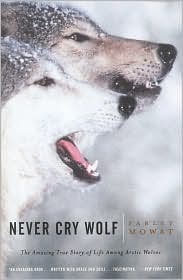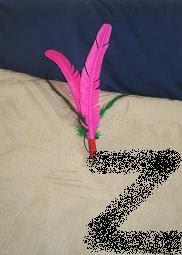Or is it? I've always liked (and been much better at) watching movies over reading books. So why did I enter a writing program? I'm not sure. Getting my MFA is just one more thing I did because it seemed like the thing to do at the time. And I am glad I did it. My only regret is not being able to predict what it would do to my desire for reading. After being told what to read, and having it suggested (unofficially of course) HOW to read, I'm just a little tired of books.
Luckily this feeling is wearing off (albeit slowly). Yes folks, I read a book, a thin one... and it only took me two weeks! The difference this time is, I read a book I actually wanted to read. About a month ago, I drafted the first few pages of what will be my second novel. It will have just a touch of wolf theme to it, so I knew Never Cry Wolf would be one of the books I should read before getting any deeper into the new project. I'd been thinking about it in recent months, so what do you think I happened upon a few weeks ago among the remainders of an estate giveaway? Never Cry Wolf by Farlet Mowat. (I read a much older copy with a different cover, but I couldn't find an image of it online. Anyway, this newer one's got a stunning picture of wolves on it, so enjoy....)

My first surprise was that it's a work of nonfiction. I always thought it was fiction. (Hey, I was like six or something when I saw the movie.) Not that that matters. But because I have an MFA now, I can't just read a book without critiquing it, which is how I noticed Mowat's packed writing style. Mostly, I noticed because I've had constipated sentences on the brain lately from reading the words in my own thesis. Mowat's writing and my own seem evidence of what happens when the science-minded turn to creative writing. Each sentence is a crowd of words and ideas, making paragraph progress like a bushwhack through the briars.
Of course, as one who enjoys advancing through wild, tangled brush, Mowat's prose didn't really bother me. I don't need a clearly worn path, in woods or ideas. Advancing through the thorny patches is just more fun for me. Maybe it hurts a little, and the going is slow, but that is the satisfaction that comes from the kind of genuine problem solving that scientists seem to enjoy most. What's more, I have plain respect for the time Mowat probably spent crafting each sentence, even if the eventual combination produced an overworked whole.
But why am I even going into all this? Only within the confines of the academy does the Department of Arts and Letters get the final say on matters of creative writing. In the real world, science matters too. Yet the institution must have attached itself somewhere inside me, because here I type, supposedly a free man, and all I can do is try to rationalize what needs no reason. The arrangement of the words hardly matters when the emotion's there. That's what writing is mostly about, isn't it? Bringing your own emotions, and hoping the readers bring theirs?
Well, Mowat does this for sure. His work illuminates the very honest lives of wolves for those willing to change their minds about the well-rumored darkness of a species. The result was my eventual last step at the end of a one-paragraph epilogue that's nothing but a flat-out downer. For 175 pages, I discovered a beautiful family of wolves through Mowat's human eyes. Then on page 176, he hits me right in the eyes with two separate, but equally startling beams of harsh light: uncertainty and senselessness. Not even he knows what ever happened to the wolf family he (and I) came to love, but he does make one thing very clear in that epilogue. Humans are quite capable of letting their fears consume them, so much so that groundless human fears alone have the power to destroy all those things more innocent than humans themselves.
If you haven't read it before, you will most definitely find surprises in this book. Highly recommended.


4 comments:
I think the arrangement of words matters quite a bit---arrangement can heighten or deaden emotion. Sometimes I write promo material for non-profits. My friends/clients count on me to turn their sympathy generating information into tear-jerking, checkbook-retrieving responses.
JG
Sure. But I'm not arguing that emotion can't come from words. All I'm saying is, a more scientific arrangement of words can also express emotion from the whole, rather than constantly striving for it throughout.
? I have no idea what "scientific arrangement of words" means. Please explain. Or send me an email.
J
By "scientific arrangement of words," I guess I mean arrangements forged more by the logical conductions of the rational brain (as opposed to the more poetic enlightenments of the intuitive brain).
Post a Comment